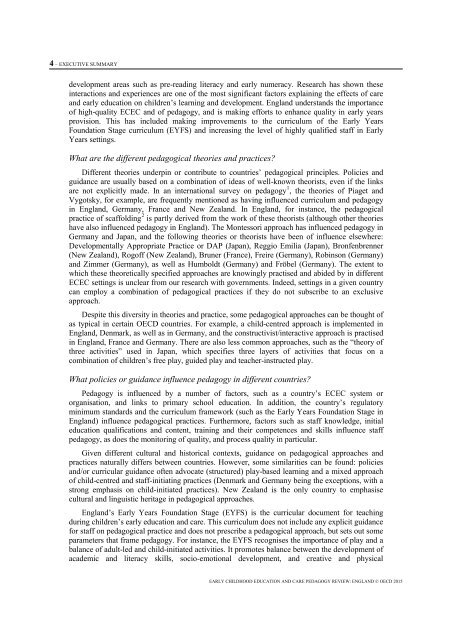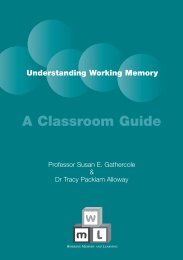early-childhood-education-and-care-pedagogy-review-england.pdf?utm_content=bufferb49b1&utm_medium=social&utm_source=twitter
early-childhood-education-and-care-pedagogy-review-england.pdf?utm_content=bufferb49b1&utm_medium=social&utm_source=twitter
early-childhood-education-and-care-pedagogy-review-england.pdf?utm_content=bufferb49b1&utm_medium=social&utm_source=twitter
You also want an ePaper? Increase the reach of your titles
YUMPU automatically turns print PDFs into web optimized ePapers that Google loves.
4 – EXECUTIVE SUMMARYdevelopment areas such as pre-reading literacy <strong>and</strong> <strong>early</strong> numeracy. Research has shown theseinteractions <strong>and</strong> experiences are one of the most significant factors explaining the effects of <strong>care</strong><strong>and</strong> <strong>early</strong> <strong>education</strong> on children’s learning <strong>and</strong> development. Engl<strong>and</strong> underst<strong>and</strong>s the importanceof high-quality ECEC <strong>and</strong> of <strong>pedagogy</strong>, <strong>and</strong> is making efforts to enhance quality in <strong>early</strong> yearsprovision. This has included making improvements to the curriculum of the Early YearsFoundation Stage curriculum (EYFS) <strong>and</strong> increasing the level of highly qualified staff in EarlyYears settings.What are the different pedagogical theories <strong>and</strong> practices?Different theories underpin or contribute to countries’ pedagogical principles. Policies <strong>and</strong>guidance are usually based on a combination of ideas of well-known theorists, even if the linksare not explicitly made. In an international survey on <strong>pedagogy</strong> 1 , the theories of Piaget <strong>and</strong>Vygotsky, for example, are frequently mentioned as having influenced curriculum <strong>and</strong> <strong>pedagogy</strong>in Engl<strong>and</strong>, Germany, France <strong>and</strong> New Zeal<strong>and</strong>. In Engl<strong>and</strong>, for instance, the pedagogicalpractice of scaffolding 2 is partly derived from the work of these theorists (although other theorieshave also influenced <strong>pedagogy</strong> in Engl<strong>and</strong>). The Montessori approach has influenced <strong>pedagogy</strong> inGermany <strong>and</strong> Japan, <strong>and</strong> the following theories or theorists have been of influence elsewhere:Developmentally Appropriate Practice or DAP (Japan), Reggio Emilia (Japan), Bronfenbrenner(New Zeal<strong>and</strong>), Rogoff (New Zeal<strong>and</strong>), Bruner (France), Freire (Germany), Robinson (Germany)<strong>and</strong> Zimmer (Germany), as well as Humboldt (Germany) <strong>and</strong> Fröbel (Germany). The extent towhich these theoretically specified approaches are knowingly practised <strong>and</strong> abided by in differentECEC settings is unclear from our research with governments. Indeed, settings in a given countrycan employ a combination of pedagogical practices if they do not subscribe to an exclusiveapproach.Despite this diversity in theories <strong>and</strong> practice, some pedagogical approaches can be thought ofas typical in certain OECD countries. For example, a child-centred approach is implemented inEngl<strong>and</strong>, Denmark, as well as in Germany, <strong>and</strong> the constructivist/interactive approach is practisedin Engl<strong>and</strong>, France <strong>and</strong> Germany. There are also less common approaches, such as the “theory ofthree activities” used in Japan, which specifies three layers of activities that focus on acombination of children’s free play, guided play <strong>and</strong> teacher-instructed play.What policies or guidance influence <strong>pedagogy</strong> in different countries?Pedagogy is influenced by a number of factors, such as a country’s ECEC system ororganisation, <strong>and</strong> links to primary school <strong>education</strong>. In addition, the country’s regulatoryminimum st<strong>and</strong>ards <strong>and</strong> the curriculum framework (such as the Early Years Foundation Stage inEngl<strong>and</strong>) influence pedagogical practices. Furthermore, factors such as staff knowledge, initial<strong>education</strong> qualifications <strong>and</strong> content, training <strong>and</strong> their competences <strong>and</strong> skills influence staff<strong>pedagogy</strong>, as does the monitoring of quality, <strong>and</strong> process quality in particular.Given different cultural <strong>and</strong> historical contexts, guidance on pedagogical approaches <strong>and</strong>practices naturally differs between countries. However, some similarities can be found: policies<strong>and</strong>/or curricular guidance often advocate (structured) play-based learning <strong>and</strong> a mixed approachof child-centred <strong>and</strong> staff-initiating practices (Denmark <strong>and</strong> Germany being the exceptions, with astrong emphasis on child-initiated practices). New Zeal<strong>and</strong> is the only country to emphasisecultural <strong>and</strong> linguistic heritage in pedagogical approaches.Engl<strong>and</strong>’s Early Years Foundation Stage (EYFS) is the curricular document for teachingduring children’s <strong>early</strong> <strong>education</strong> <strong>and</strong> <strong>care</strong>. This curriculum does not include any explicit guidancefor staff on pedagogical practice <strong>and</strong> does not prescribe a pedagogical approach, but sets out someparameters that frame <strong>pedagogy</strong>. For instance, the EYFS recognises the importance of play <strong>and</strong> abalance of adult-led <strong>and</strong> child-initiated activities. It promotes balance between the development ofacademic <strong>and</strong> literacy skills, socio-emotional development, <strong>and</strong> creative <strong>and</strong> physicalEARLY CHILDHOOD EDUCATION AND CARE PEDAGOGY REVIEW: ENGLAND © OECD 2015



